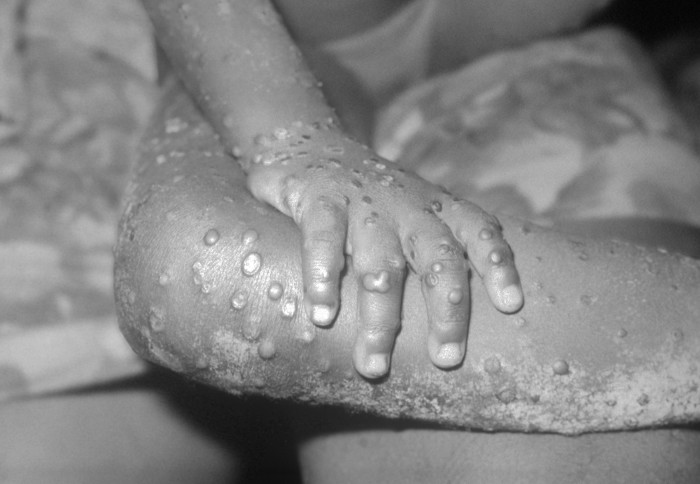"Monkeypox cases not a threat but a reminder of our vulnerability to viruses"
by Ellyw Evans

Monkeypox lesions on a child
Following reports of monkeypox cases in the UK, we speak to Dr Mike Skinner on what we know about this rare zoonotic disease.
Over recent years there have been a handful of imported cases of monkeypox in the UK, with the latest two cases reported last week. While this is a very rare event, it sparks the question of what the risk of infection for the public is?
We speak to Dr Mike Skinner of Imperial’s Department of Infectious Disease, an expert in poxviruses with long experience and interest in emerging viruses, about why sporadic cases of monkeypox in the UK are not an immediate cause for concern but are a reminder of the threat zoonotic disease may pose to humans.
Monkeypox is a cousin of smallpox
"Monkeypox is a rare disease caused by the monkeypox virus. The virus belongs to the orthopoxvirus family which also includes variola, the now-eradicated virus that causes smallpox. Until recently, monkeypox occured primarily in remote rainforest areas of central and West Africa but there have been a few imported cases worldwide in recent years, including to the UK. One of which led to infection of a hospital care-worker, exposed before monkeypox was diagnosed in the patient."
"There are two distinct genetic variants of the virus – the Congo Basin and the West African clades – with the former found to be more transmissible and with a higher fatality rate of up to 10%. The illness comes in two phases: the first phase where people will experience fever and swollen glands, and the second phase where pustules and lesions on the skin appear."
Despite the name, monkeys aren’t the natural source of the virus
"Monkeypox was first discovered in 1958 in captive monkeys used for research – hence the name. However, the natural reservoir of monkeypox remains unknown, though species such as rodents and squirrels have been implicated, indeed such animals imported from Africa as pets were the source of the 2003 outbreak in the US."
"The virus transmits to people when they are either bitten or come into direct contact with wild animals infected with monkeypox. Secondary transmission, human-to-human, occurs through contact with lesions (or skin dust in say bedding, or respiratory droplets."
Monkeypox is rare, especially outside of Africa.
"The first case of monkeypox in the UK was recorded in 2018 in a Nigerian national staying at a naval base in Cornwall. Unusually, a couple of days later a second, unrelated case was confirmed in Blackpool, also from a person who had also returned to the UK from Nigeria."
"Since then in the UK, there was a case in 2019, with the latest cases reported last week in two people who acquired the virus overseas. All these cases were swiftly dealt with by Public Health England who isolate the diagnosed patients in a specialist unit to avoid further transmission."
Human cases are on the rise since the eradication of smallpox
"The viruses that cause smallpox and monkeypox are closely related, so prior infection with variola, or the smallpox vaccine, also protects against monkeypox. However, since the eradication of smallpox, vaccination is no longer required, which means that the global population increasingly lacks that protection."
"Over recent years, it does appear that the frequency of human monkeypox cases has increased, with some evidence of longer human-to-human transmission chains. The exportation of cases to the UK and elsewhere is probably linked to increased numbers of cases in Nigeria since 2017, with an apparent case fatality ratio of 6%. Genomic analysis showed that most of the recorded 122 cases (with the exception of an outbreak in a prison) seemed to be independent, indicating likely zoonotic origins.”
There are gaps in our research
"Since the history of monkeypox in humans is relatively recent, there are gaps in our understanding of the wildlife reservoir(s) of monkeypox virus and its transmission to humans. We also need to monitor for significant changes in the monkeypox virus genome, which is DNA and is more than six times longer than the RNA genome of SARS-CoV-2, making it difficult but helped by the latest technologies. Research on monkeypox virus itself can only be conducted in bio-secure biosafety level 4 laboratories such as those at PHE Porton in the UK."
"Fortunately, we have smallpox vaccines available in the event of an outbreak, with work conducted over recent years to reduce their side effects, and there has been considerable effort to develop orthopoxvirus-specific antivirals, such as tecovirimat (TPOXX)."
"Although the relative risk to the public is currently very low, sporadic cases such as this are yet another warning signal that zoonotic viruses are a threat to global health security and should be taken seriously, requiring monitoring of potential animal reservoirs and of at-risk human populations."
Article text (excluding photos or graphics) © Imperial College London.
Photos and graphics subject to third party copyright used with permission or © Imperial College London.
Reporter
Ellyw Evans
Faculty of Medicine Centre